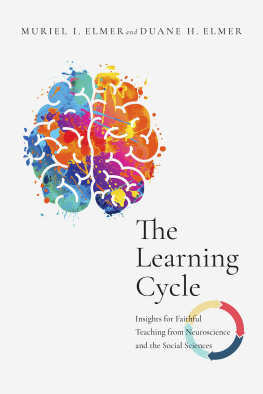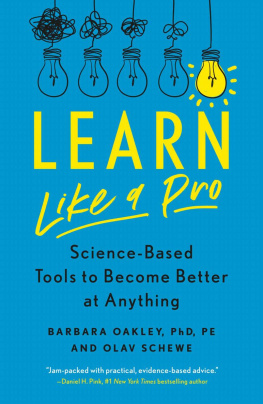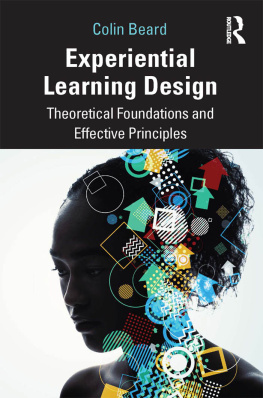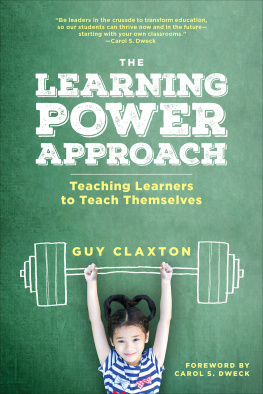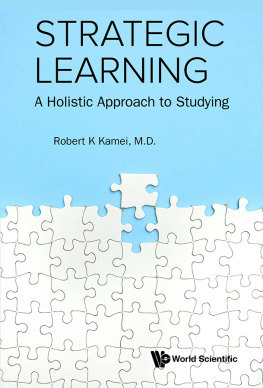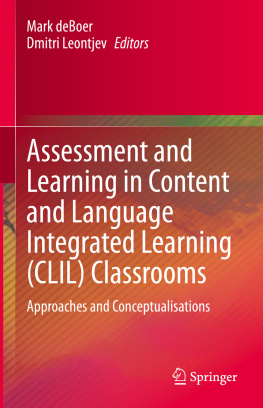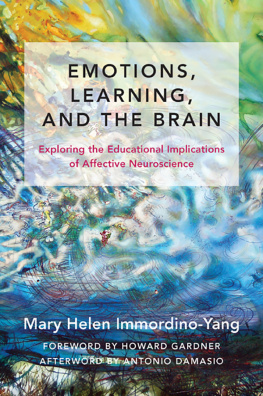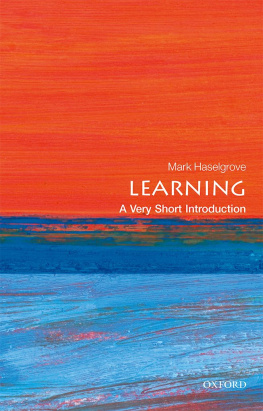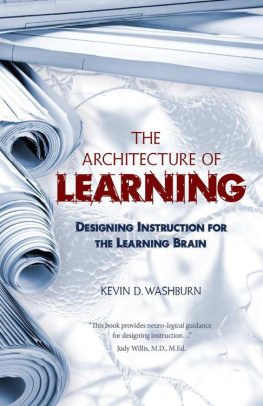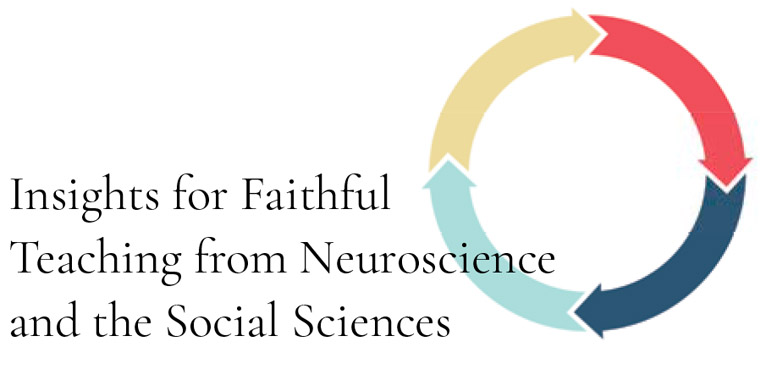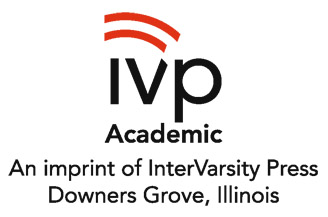Sommaire
Pagination de l'dition papier
Guide
The
Learning
Cycle
MURIEL I. ELMER
and DUANE H. ELMER
InterVarsity Press
P.O. Box 1400, Downers Grove, IL 60515-1426
ivpress.com
2020 by Duane Elmer and Muriel Elmer
All rights reserved. No part of this book may be reproduced in any form without written permission from InterVarsity Press.
InterVarsity Pressis the book-publishing division of InterVarsity Christian Fellowship/USA, a movement of students and faculty active on campus at hundreds of universities, colleges, and schools of nursing in the United States of America, and a member movement of the International Fellowship of Evangelical Students. For information about local and regional activities, visit intervarsity.org.
All Scripture quotations, unless otherwise indicated, are taken from The Holy Bible, New International Version, NIV. Copyright 1973, 1978, 1984, 2011 by Biblica, Inc. Used by permission of Zondervan. All rights reserved worldwide. www.zondervan.com. The NIV and New International Version are trademarks registered in the United States Patent and Trademark Office by Biblica, Inc.
While any stories in this book are true, some names and identifying information may have been changed to protect the privacy of individuals.
Figure 4.1 and Figure 4.2 are from David A. Sousa, How the Brain Learns, 5th ed. (Thousand Oaks, CA: Corwin Press, 2017), 101-102. Used by permission of Corwin Press.
Cover design and image composite: Cindy Kiple
Interior design: Daniel van Loon
Images: business pie chart with arrows: Fireofheart / iStock / Getty Images Plus
human brain illustration: Ukususha / iStock / Getty Images Plus
ISBN 978-0-8308-5530-8 (digital)
ISBN 978-0-8308-5383-0 (print)
This digital document has been produced by Nord Compo.
TO OUR MOTHERS
Mary Sophie Danielson
Ruby Lorene Elmer
Whose love, encouragement, faith, and
prayers have guided our lives
In Gratitude
T his book represents our more than fifty extraordinary years together teaching and learning. During all those years we sat at the feet of a host of teachers and mentors, both past and present, who prodded our thinking and challenged our assumptions. To them we owe a great debt.
We can name only a few:
Ted Ward, who showed us best practices, exposed us to the best literature, and pushed us to new horizonsall the while creating in us an unquenchable thirst for We can do it better.
The hundreds of students and workshop participants who critiqued our Learning Cycle, asked where it was written, and went on to use it in their own teaching careers.
Miriam, Bas, and Scott, whose letters of recommendation paved the way to a publishing contract.
Fred Van Dyke, who chose to experiment with the Learning Cycle in his Sunday school class and help his learners actually practice Jesus words in Matthew 6.
Those willing to persistently plow through our first draft, or sections of it, and make it substantially better: Lisa Anderson-Umaa, Marie-Claire Weinski, Sherry Bohn, Mary Macaluso, and Laura Van Vuuren. We are also grateful to Cheryl Warner for her editing, Dave Conner for resources, and Valerie Umaa Anderson for timely material.
Friends who over the period of a couple of years forwarded countless resource ideas for us to explore and strengthen our writing.
Al Hsu, our editor, who graciously shepherded The Learning Cycle to publication; and Evelyn and Breanna for their indexing.
And finally, a host of prayer warriors who faithfully prayed for wisdom and clarity as we went to our computers each daygood friends, colleagues, family members, and a small group of Thursday morning praying sisters: JoAnn, Carol, Diane, and Judy.
With gratitude we thank you for believing in us. Above all, we thank our heavenly Father, who in his mercy made it possible for us to write this book.
Laying the Foundation
I have no greater joy than this, to hear of my children walking in the truth.
3 JOHN 4 (NASB)
Our task in ourselves and in others is to transform right answers into automatic responses in real life situations.
DALLAS WILLARD, THE DIVINE CONSPIRACY
A FTER LAUNCHING my four-year teaching career in a Bible college in South Africa, I (Duane) was invited back ten years later to speak at a conference. It gave me opportunity to reconnect with former students. Moses (his real name) would be the first. I was looking forward to it because I had poured myself into my classes and thought that, for a first-time faculty member, I had done a credible job.
We met over a delicious meal of curry and rice. I asked Moses how he was. He rehearsed how God called him away from managing an automobile dealership to our Bible college and then to ministry. All went well until after graduation. Things had gone badly for him in the pastorate. His son, a police officer, was killed in public for undetermined reasons, and other family tragedies followed. He left the ministry. In spite of all this, he was now a successful insurance salesman but sour on God, the church, and Christianity.
So, what went wrong, Moses? I asked, feeling overwhelmed by the tragedies and now his fragile faith.
I dont think my Bible school education prepared me for church ministry or the problems I would be facing. He spoke without anger or criticism, just the facts as he saw it.
The jarring reality hit me: As one of his teachers, I had failedand, frankly, failed quite miserably. It stung badly not only because of the words but because it came from a mature person of considerable talent, intellect, and potential. I felt responsible though Moses never hinted I was to blame. But I could not escape the fact that I had been a major part of his educational experience.
Moses had stood out from the other students, a sentiment apparently shared by the entire student body. They elected him president his first week on campus, a rarity given the multiracial mix of the people who unanimously voted him into the office. He did not disappoint their confidence. He was re-elected in his second year but then declined the next two years stating that other people should have the opportunity for leadership.
Moses had brought a steadying influence to our campus with mature thinking, dedicated scholarship, a disciplined work ethicin addition to being humble, articulate, and honorable. All the things a faculty could hope for, especially a new faculty member like myself. Moses and I had connected well and could easily have been best friends were it not for the faculty-student protocol requiring formality and distance in such relationships.
Shuffling the curry and rice around on his plate, Moses continued answering my question. In summary, he said he did not feel that class material was connected to life issues he would be facing. Much of the lecture material, though well prepared and delivered competently, was never perceived as relevant. Little time was offered for class discussion. Students were left on their own to figure out how the material applied to their lives. He was told what to believe, what to memorize, but not how it connected to South African realities of apartheid. Being told

